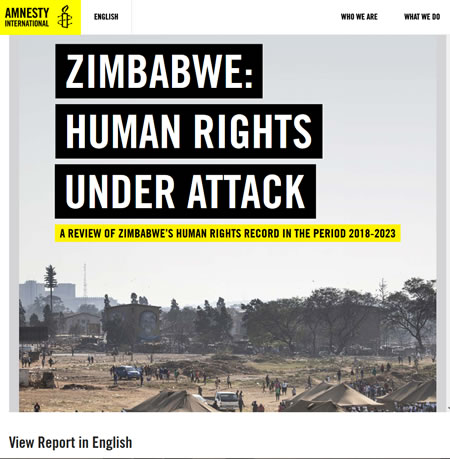 "Zimbabwe: Human rights under attack: A review of Zimbabwe’s human rights record in the period 2018-2023"
"Zimbabwe: Human rights under attack: A review of Zimbabwe’s human rights record in the period 2018-2023"
"This advocacy briefing looks at the human rights record in Zimbabwe from the time that Emmerson Mnangagwa took Office as President of Zimbabwe. It assesses the extent to which the present government has failed to reform the abysmal legacy of human rights under Robert Mugabe. It further demonstrates that there has not been a real shift in the human rights legacy between the Mugabe and the Mnangagwa presidencies. It makes several recommendations to the government on how a real shift could be achieved, including by simply adhering to the Constitution of Zimbabwe."
The above has been copied verbatim from the Amnesty International Website and the full PDF report can be viewed and/or downloaded by clicking HERE Published on the 29th September 2023 it is a damning testimony of Zanu PF and Mnangagwa's toxic dictatorship.
Amnesty International Zimbabwe have been campaigning for Human Rights in Zimbabwe for a very long time. They are advocates for justice and democracy - two aspects {amongst many others} that are clearly and evidently 'missing' in Zimbabwe. Here their campaign regarding Job Sikhala is made quite evident [Amnesty International Zimbabwe - Job Sikhala]
Their tireless activities to highlight the crimes and criminality of the Zanu PF military regime, is carried out at the same time as their campaigns to help the down-trodden citizens in Zimbabwe.
"Human rights change starts with the facts. Our experts do accurate, cross-checked research into human rights violations by governments and others worldwide."
"We use our analysis to influence and press governments, companies and decision-makers to do the right thing."
"Through petitions, letters and protests, campaigners worldwide press for action from the people and institutions who can make change happen."
Amnesty International Zimbabwe follow ZHRO on X/Twitter - you should too. @ZHRO_Zimbabwe
From the Introduction of this Review of Mnangagwa's {illegal and} ruinous rule over the citizens of Zimbabwe.
"The human rights situation in Zimbabwe has been a cause for great concern for many years. The enduring legacy of the late former president Robert Mugabe’s government was undoubtedly one of violence and oppression. Under Robert Mugabe’s rule, human rights were severely curtailed for decades, as violence characterised electoral processes, opposing voices were persecuted and protests violently dispersed. The resignation of Robert Mugabe as president in 2017 through a military-assisted transition and the holding of elections in 2018 raised hope for a new Zimbabwe.
The sense that human rights reform could be achieved in Zimbabwe was palpable and shared by both Zimbabweans and the international community. In his inauguration speech, Mugabe’s successor, President Emmerson
- Dambudzo Mnangagwa outlined his vision of a new and prosperous Zimbabwe, which he called “the Zimbabwe we want.”1
- He pledged “to act fairly and impartially, without fear or favour, as a President of all Zimbabweans.”2
- Although the speech focused on achieving economic development in what he referred to as the Second Republic, the new president promised that his government would be “responsive to the people’s needs.”3
Instead, five years on, Mnangagwa’s government has failed to break from the past and continued to crack down on human rights. The state authorities have employed various methods to suppress dissenting voices. Policing has increasingly been militarised and the excessive use of force by law enforcement during protests has become all too common. As a result, the space for civic engagement has continued to shrink rapidly, making it increasingly difficult for individuals and groups to freely express themselves peacefully, safely, and effectively.
Since 2018, austerity measures, COVID-19 and natural disasters pushed many deeper into conditions of poverty and financial insecurity, that amounted to a denial of their economic, social and cultural rights. The public healthcare system collapsed under the strain of the pandemic, with patients at public hospitals facing shortages of essential medicines. When available, medicines and ambulance services were inaccessible due to the high cost of out-of-pocket payments.
Zimbabweans also faced significant food shortages due to the economic crisis and frequency of natural disasters. The government did not put in place adequate measures to mitigate the food crisis and uphold the right to food.
The government also continued to forcibly evict people without providing adequate alternative housing. Women in Zimbabwe faced challenges in accessing sexual and reproductive health services, with many maternal deaths resulting from COVID-19-related restrictions on movement and young girls facing barriers to sexual and reproductive health information.
- 1). Emmerson Mnangagwa, “Inauguration Speech by the incoming President of the Republic of Zimbabwe”, 26 August 2018, p. 12, zimcitizenswatch.org
- 2). Mnangagwa, “Inauguration Speech” (previously cited), p. 12
- 3). Mnangagwa, “Inauguration Speech” (previously cited), p. 13-14
